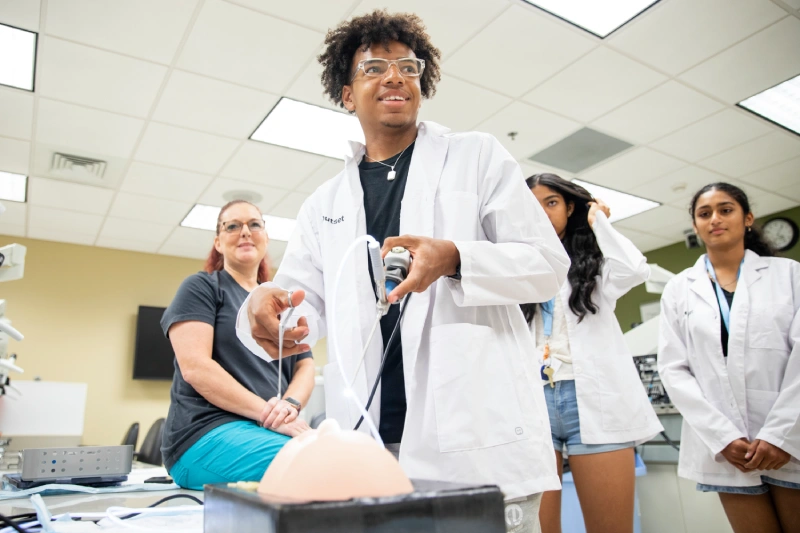Thinking about becoming a doctor? It's a big decision—with some awesome perks and tough challenges. On the bright side, doctors save lives, help keep communities healthy, and earn the trust of people who rely on them, which often brings both financial security and respect.
But it's not all sunshine and rainbows. Long shifts, being on call nights and weekends, and endless paperwork can be draining. You might have to sacrifice time with family and even neglect your own well-being. Learning strategies to cope with these challenges is important.
Pros of Being a Doctor
Helping People and Making a Difference
At its core, being a doctor is about improving lives and strengthening communities. You diagnose, treat, and promote preventive care that can change someone's world. Catching a disease early, like cancer, can give patients a fighting chance. Through public outreach—think blood drives or health fairs—you educate people about managing conditions like diabetes or high blood pressure. These efforts encourage healthier habits and help close gaps in healthcare access.
High Earning Potential
Medical professionals often earn top salaries, especially specialists like orthopedic surgeons, cardiologists, and dermatologists.
That income can offset the hefty price tag of medical school, helping you tackle student loans and achieve financial security. In private practice, bonuses and profit-sharing can further ease the burden of educational debt. According to the U.S. Bureau of Labor Statistics, physicians earn a median salary of $239,200 or more per year.
Job Security and Demand
As the population ages and technology advances, the demand for healthcare keeps growing. This means solid job security for doctors. Even when the economy wavers, employment opportunities in medicine remain strong. Analysts often list healthcare as one of the fastest-growing industries globally, promising good prospects for both new and seasoned physicians.
Variety of Career Paths
Medicine offers a wide array of specialties and roles. Beyond treating patients in pediatrics or emergency medicine, you might dive into research to improve care or focus on public health to influence policy. Physicians work in hospitals, private practices, academia, and government. So, whether you thrive in the fast pace of an ER or prefer the steady rhythm of research, there's a place for you in medicine.
Lifelong Learning and Personal Growth
Medicine requires you to keep learning to stay current with scientific breakthroughs. This constant growth expands your skills and keeps your curiosity alive. From attending workshops to diving into medical journals, doctors continually update their knowledge to provide top-notch care. For those who love intellectual challenges and practical problem-solving, this makes the job endlessly engaging.
Cons of Being a Doctor
Long and Challenging Education Path
Becoming a doctor is a long haul. It starts with a bachelor's degree and pre-med courses, then taking the MCAT. Medical school means four years of intense classes and clinical rotations. After that, residency brings long workweeks that challenge you mentally and physically. This journey builds your expertise but also tests your endurance at every step.
Expensive Education
The cost of medical school is steep—tuition and fees often reach six figures. Many graduates end up with heavy debts, which can sway them toward higher-paying specialties. Over 80% of medical students graduate with substantial debt. Scholarships and grants can help, and options like loan forgiveness programs—especially in underserved areas—provide financial relief if you're open to them.
High-Stress Job
Doctors often face urgent decisions under intense pressure. Making critical calls, sometimes with incomplete information, can be mentally exhausting. And the administrative tasks—paperwork, patient records—pile on more stress. Adopting healthy coping strategies is crucial. Mindfulness, regular exercise, and good sleep help manage anxiety and prevent burnout. Connecting with peers provides support when the emotional weight becomes too much. Professional counseling is another resource to safeguard your mental health.
Work-Life Balance Challenges
Balancing work and life isn't easy with long shifts and patients needing you at all hours. Hobbies and family time often take a backseat. Setting a schedule, drawing firm lines around your free time, and turning off work notifications can help you regain some normalcy. It's challenging, but any balance you can find contributes to a happier life outside of medicine.
Emotional and Physical Toll
The long hours, intense cases, and pressure to provide top care can take a toll on your mental and physical health. Compassion fatigue and exhaustion are real issues. Doctors need self-care strategies like regular exercise, healthy eating, and making time for rest. Connecting with peers and mentors can help you handle the emotional burden, and professional counseling is valuable too. The goal is to protect your well-being in a job that constantly challenges it.
Is Becoming a Doctor Right for You?
Becoming a doctor is a big decision that requires careful thought. Ask yourself these questions to see if this path fits your goals:
- Why do I want to become a doctor? Is it about helping others, a passion for science, or something else?
- Am I ready for the long and challenging educational journey? Medical school and residency require years of intense study.
- How do I handle stress and pressure? Doctors often face high-stress situations and need strong coping skills.
- Am I willing to commit to lifelong learning? Medicine is always evolving, and staying current is essential.
- Can I balance work with personal life? Consider how demanding hours might affect your relationships and hobbies.
- Am I prepared for the financial investment? Medical education can be expensive, leading to significant debt.
Reflecting on these questions can help you determine if becoming a doctor aligns with your strengths and ambitions. Gaining real-world experience through internships or shadowing can also provide valuable insights.
Final Thoughts
There are numerous pros and cons to being a doctor. Medicine offers immense rewards, whether you're saving lives in the ER or pushing forward research in a lab. Helping others when they need it most brings deep satisfaction. But it requires intense training, emotional strength, and significant personal sacrifice. Doctors often deal with tough schedules and challenging patient situations.
The best way to know if medicine ignites your passion is by getting firsthand experience—even before applying to medical school. Shadowing, volunteering, and learning from experienced doctors lets you compare your interests with the realities of patient care. If you have the determination, curiosity, and empathy to navigate long hours and stressful situations, the journey might be worth every challenge.














.png)








